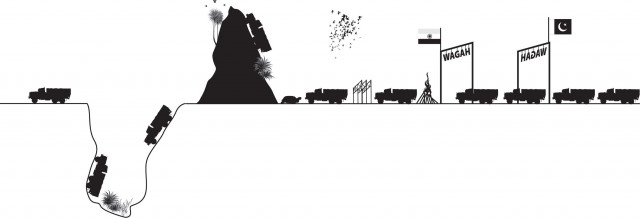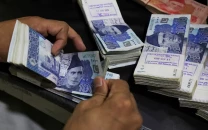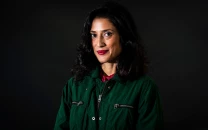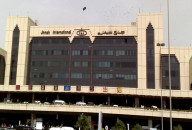India’s unfair trade practices lambasted
Pakistan has threatened to respond if India continues to obstruct exports through the use of non-trade barrier.

“In theory, they have no trade barriers against us but in practice, they have employed a number of non-trade barriers against our products,” he told a press conference at the Karachi Chamber of Commerce and Industry (KCCI).
Malik explained that the Indian government has created an extremely complicated schedule of duties and tariffs for imports which has made it impossible to calculate the exact landing cost of exports to the country.
He pointed out that the neighbouring government has ignored the development of its customs facilities at the Wagah border. “While we have the capacity to handle 30 to 40 trucks simultaneously, the Indian side can only facilitate two trucks at a time,” he highlighted.
Malik also pinned responsibility for the absence of a direct banking system on India. All transactions between Pakistan and its eastern neighbour are currently either routed through third-party banking channels or the illegal ‘hundi’ system.
The high commission has received many complaints from local businesses regarding the unfair barriers erected by the Indian authorities to restrict the entry of good coming from Pakistan.
Participants at the event highlighted that Pakistani cement manufacturers had lost out on export opportunities after the Indian government refused to accept certifications issued by the Pakistan Quality Control Authority. Instead, the government insisted that certification be acquired from a quality control authority belonging to a third country.
Attendees also complained that Pakistan’s delegations to the international trade fair in Delhi received unfair treatment and were ignored by their hosts. “The stalls allotted to our business delegates were small and in a distant corner of the trade fair,” explained KCCI chairman Abdul Majid Haji Mohammad.
He urged the speaker to request his Indian counterpart to assure that Pakistani businessmen would receive better treatment during this year’s fair, scheduled to be held in November.
It also surfaced that the Indian embassy was delaying visa applications and in many cases, denying visas altogether without assigning any reason. “Indian visas used to be processed in two days but now it takes more than 40 days and often, visas are refused without any justifiable explanation,” remarked former chairman KCCI Anjum Nisar.
Nisar suggested that similar treatment be meted out to Indian businesses until the Indian government sorted out the ‘diplomatic and technical hurdles’ created by it.
Trade between the two countries is currently heavily skewed in India’s favour. According to the high commissioner, Indian exports to Pakistan were valued at approximately $2 billion last year while Pakistan’s exports were only about $400 million.
Many Pakistani products have the potential to compete in Indian markets, particularly the southern states. These are especially lucrative for exporters because goods can be provided at a much lower cost than those shipped to these states from the northern parts of India. During a recent trip to Pakistan, the Indian Finance Minister Pranab Mukherjee commented that the sky was the limit for trade between India and Pakistan. However, Pakistani business owners are of the opinion that this is only possible if unfair trade practices are stopped and competitive forces are allowed to shape market trends.
Malik assured the audience that Pakistan would respond with similar barriers if the Indian authorities continued to employ unfair trade practices. “India has granted the status of most preferred nation to Pakistan but it is still using technicalities to limit market access to our firms,” he commented.
Published in The Express Tribune, July 30th, 2010.



















COMMENTS
Comments are moderated and generally will be posted if they are on-topic and not abusive.
For more information, please see our Comments FAQ